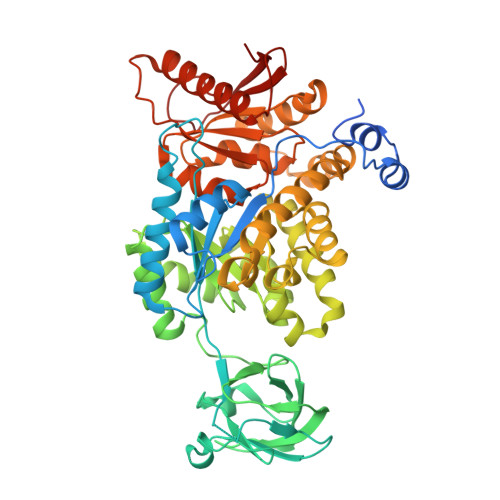GSH as an A-A Type Allosteric Activator of PKM2: Modulating Cancer Cell Homeostasis and Ferroptosis Susceptibility.
Chen, T.J., Lo, C.J., Wu, M.J., Sit, W.Y., Hsu, H.Y., Huang, Y.C., Lu, C.H., Chen, Y.L., Fang, W.K., Yang, S.M., Chen, P.L., Haraguchi, T., Hiraoka, Y., Lin, C.Y., Cheng, M.L., Yang, M.H., Kung, H.J., Wang, W.C.(2025) Adv Sci (Weinh) : e19368-e19368
- PubMed: 41215470
- DOI: https://doi.org/10.1002/advs.202519368
- Primary Citation of Related Structures:
9IQQ - PubMed Abstract:
This study identifies glutathione (GSH) as an endogenous A-A type allosteric activator of pyruvate kinase M2 (PKM2), stabilizing it in its active tetrameric form through binding at the A-A interface. This PKM2-GSH interaction links GSH metabolism to ferroptosis regulation. Transcriptomic analyses across cancers demonstrate strong correlations between GSH, SLC7A11, PKM2, glycolysis, and ferroptosis pathways. By depleting GSH and activating PKM2, ferroptosis is enhanced in PKM2-dependent cancer models. This approach leads to significant changes in central carbon and lipid metabolism, disrupts mitochondrial function, and drives ferroptotic cell death. The combined treatment markedly suppresses tumor growth in a xenograft model. Elevated PKM2 and SLC7A11 expression levels correlate with poorer survival outcomes, indicating their potential as biomarkers for ferroptosis-based therapy. The findings demonstrate a dual role for GSH in cellular homeostasis and identify the PKM2-GSH-SLC7A11 axis as a therapeutic target for aggressive cancers.
- Institute of Molecular and Cellular Biology and Department of Life Science, National Tsing Hua University, Hsinchu, 300044, Taiwan.
Organizational Affiliation:


















